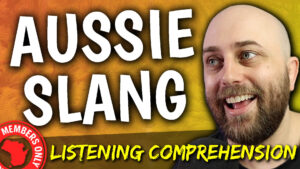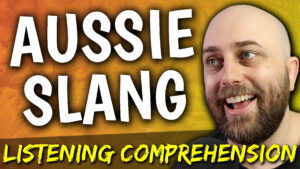
AE 1288 - The Goss
Why is Hitchhiking Illegal in Australia
Learn Australian English by listening to this episode of The Goss!
These are conversations with my old man Ian Smissen for you to learn more about Australian culture, news, and current affairs.

In today's episode...
G’day, you mob! If you’re keen to have a yarn about the good ol’ days of hitchhiking Down Under and how things have changed over time, this episode’s for you!
Pete and his dad, Ian, spin a yarn about how hitchhiking was once a common way to get around, especially when cars were as rare as hen’s teeth.
They’ll also get you thinking about how things have changed, not just with transport, but with technology and even what we put on our plates.
It’s a fair dinkum Aussie chat that’ll give you a good laugh and a bit of a chinwag about the past. So grab a cuppa, chuck on your headphones, and have a listen!
** Want to wear the kookaburra shirt? **
Get yours here at https://aussieenglish.com.au/shirt
Improve your listening skills today – listen, play, & pause this episode – and start speaking like a native English speaker!
Listen to today's episode!
This is the FREE podcast player. You can fast-forward and rewind easily as well as slow down or speed up the audio to suit your level.
If you’d like to use the Premium Podcast Player as well as get the downloadable transcripts, audio files, and videos for episodes, you can get instant access by joining the Premium Podcast membership here.
Get more out of every episode!

Premium Podcast members get access to...
- All 900+ podcast episodes including member-only episodes
- Member-only episode video lessons
- Downloadable transcript PDFs & audio files for every episode

Recent Episodes:


AE 1361 – The Goss: TV Shows We’re Currently Binge Watching [Members Only]

AE 1360 – 20 English Idioms Explained | Members Only

AE 1359 – 20 English Idioms To Transcribe

AE 1358 – How to Pronounce -ED Endings in Australian English [Members Only]

AE 1357 – How to Pronounce -ED Endings in Australian English

AE 1356 – Will AI Save Us Or Replace Us?

AE 1355 – 20 Aussie Slang Sentences Explained [Members Only]

AE 1354 – 20 Aussie Slang Sentences to Transcribe

Share

Join my 5-Day FREE English Course!
Complete this 5-day course and learn how to study effectively with podcasts in order to level up your English quickly whilst having fun!


Want to improve a specific area of your English quickly and enjoyably?
Check out my series of Aussie English Courses.
English pronunciation, use of phrasal verbs, spoken English, and listening skills!

Want to improve a specific area of your English quickly and enjoyably?
Check out my series of Aussie English Courses.
English pronunciation, use of phrasal verbs, spoken English, and listening skills!
Leave a comment below & practice your English!







Responses